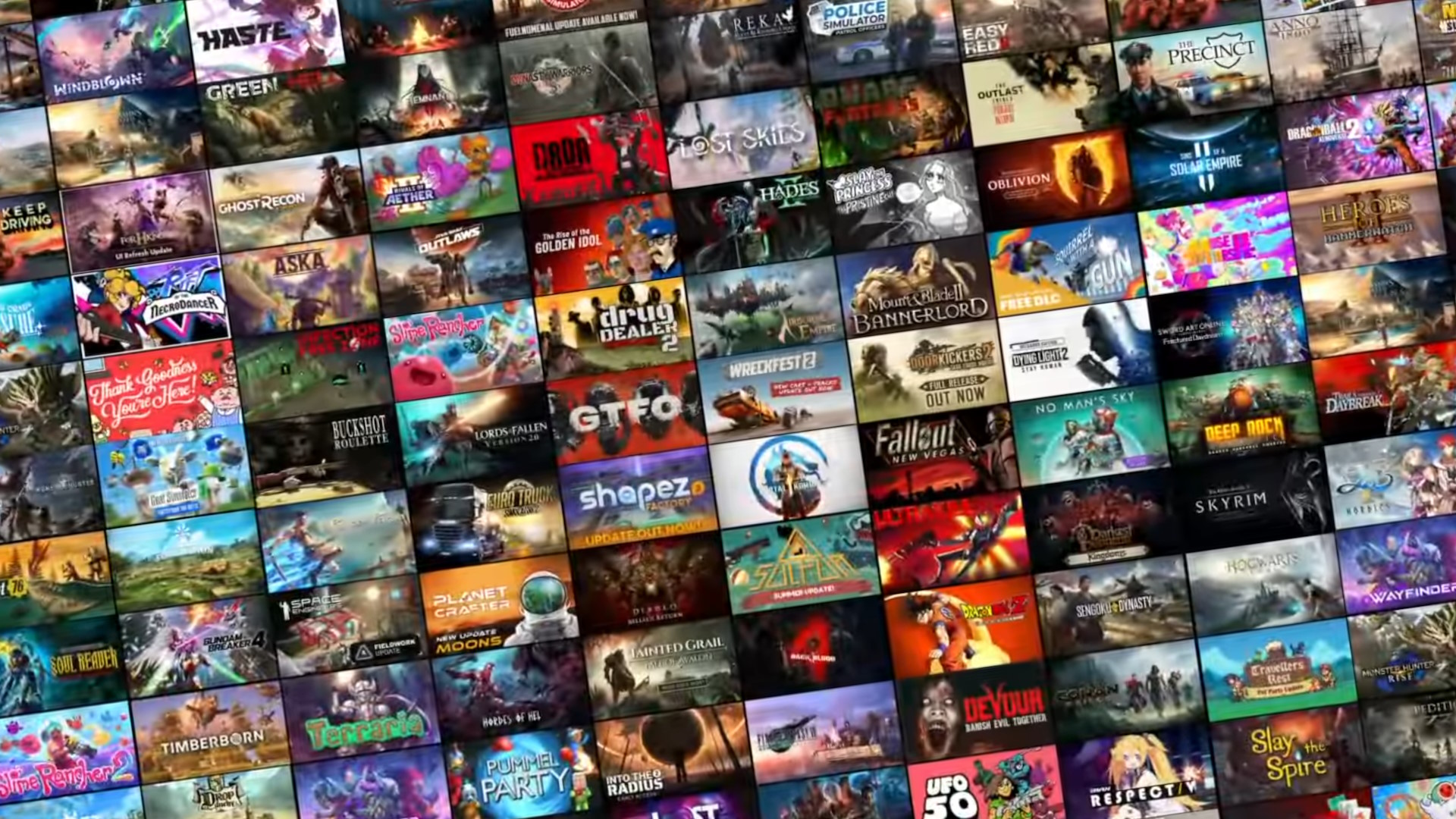'Knowing Steam players are hoarders explains why you give Valve that 30%,' analyst tells devs: 'You get access to a bunch of drunken sailors who spend money irresponsibly'
"More than likely the person buying your game is not going to play it."

Keep up to date with the most important stories and the best deals, as picked by the PC Gamer team.
You are now subscribed
Your newsletter sign-up was successful
Want to add more newsletters?

Every Friday
GamesRadar+
Your weekly update on everything you could ever want to know about the games you already love, games we know you're going to love in the near future, and tales from the communities that surround them.

Every Thursday
GTA 6 O'clock
Our special GTA 6 newsletter, with breaking news, insider info, and rumor analysis from the award-winning GTA 6 O'clock experts.

Every Friday
Knowledge
From the creators of Edge: A weekly videogame industry newsletter with analysis from expert writers, guidance from professionals, and insight into what's on the horizon.

Every Thursday
The Setup
Hardware nerds unite, sign up to our free tech newsletter for a weekly digest of the hottest new tech, the latest gadgets on the test bench, and much more.

Every Wednesday
Switch 2 Spotlight
Sign up to our new Switch 2 newsletter, where we bring you the latest talking points on Nintendo's new console each week, bring you up to date on the news, and recommend what games to play.

Every Saturday
The Watchlist
Subscribe for a weekly digest of the movie and TV news that matters, direct to your inbox. From first-look trailers, interviews, reviews and explainers, we've got you covered.

Once a month
SFX
Get sneak previews, exclusive competitions and details of special events each month!
Hold up folks: games industry analyst Chris Zukowski has cracked it, and knows exactly what you're all like. Nothing but a bunch of hoardy hoarders! Yes I'm looking at YOU with your huge Steam library, bulked-out greedily during every big sale, and which you've only ever played half of (and that's being generous). The truth… is in there.
"The amazing thing about Steam and its player base is that they buy games they aren’t going to play," says Zukowski in a new post (first spotted by GR+). "More than likely the person buying your game is not going to play it."
I resemble that remark. Zukowski conjures up the spirit of Reed Hastings, the co-founder of Netflix, and specifically his remarks that the streaming platform isn't just competing with the likes of HBO, but also things like Fortnite and, in the extreme cases where you get hooked on a box set and it's past 1 am, sleep. In such a scenario, what chance does a poor little indie game have of snatching an hour?

👉Check out our list of guides👈
1. Best gaming laptop: Razer Blade 16
2. Best gaming PC: HP Omen 35L
3. Best handheld gaming PC: Lenovo Legion Go S SteamOS ed.
4. Best mini PC: Minisforum AtomMan G7 PT
5. Best VR headset: Meta Quest 3
Zukowski reckons that's just not the issue: "The reason Steam makes indies so much money compared to all the other platforms is that they have built up an audience that is full of super die-hard hobbyists… Basically, hobbyists buy stuff not because they actually want to consume it, but because they are collecting it."
This is illustrated by the so-called "pile of shame" from various hobbies: great stacks of Lego sets waiting to be built; a room crammed with Warhammer model kits; the Everest-like mounds of yarn that knitters call their "stash." Apparently the Japanese even have a word for those who buy books and pile them up knowing they won't read them: "tsundoku."
We make a brief stop by an older article from Simon Carless that analysed Steam collections and found the median player on there has 51.5% of their collection unplayed. The take-home message?
"Valve cracked the problem that Netflix was struggling with: how do you sell to people who have so much entertainment at their fingertips that they don’t have enough hours in the day to play and watch it all," says Zukowski. "Valve basically added infinite hours to a gamer’s day, it is a theoretical future day where gamers might someday spend hours playing your game (but let’s be honest, won’t).
Keep up to date with the most important stories and the best deals, as picked by the PC Gamer team.
"The reason game developers are willing to give Valve 30% of their revenue is because the Steam marketplace is packed with super gamers who throw money at games they have no intention of playing."

While there's no denying Zukowski has a point, I would just slightly put the brakes on before applying this to Steam as a whole. Player habits are constantly changing, and so are players themselves. I'd definitely have fitted this description of Steam players years ago, and remain guilty as charged when it comes to the tsundoku label, but these days am much more careful about what I buy on Steam: purely because I've had that experience of blowing $40 in a Steam sale on a dozen games that I never played, multiple times. I agree that most of us are hoarders of some sort: I'm just not sure that behaviour persists across our lifetime on Steam. Anyway.
"Steam players get satisfaction out of finding a hidden gem and adding it to their collection," posits Zukowski, because "...hobbyists find satisfaction in collecting. Even if they know deep down that they will never actually play it." The fact that loads of people will buy a game but never play it is actually, drum roll please, a massive boon for developers.
"If Steam shoppers were rational and only bought games they were going to play, we would sell a lot fewer games," says Zukowski. "Half this industry would be gone.
"Knowing Steam players are hoarders explains why you give [Valve] that 30%: you get access to a bunch of drunken sailors who spend money irresponsibly."
There are a lot of common sense observations Zukowski makes about this: developers can't really take advantage of such information, and ratios of played / not played aren't worth obsessing over. If a game is either popular or in some sort of bundle, it's also more likely to have higher numbers of owners who haven't played it. Zukowski also has a pet theory, which I find persuasive, that having a clear genre helps games do better on Steam: because people know that they like, for example, open world survival crafting games, and will buy yours even though they've got 20 more in their library to get through first.
Zukowski ends with a mea culpa, showing that he hasn't played 2/3rds of the games in his Steam library (you can check your own stats via SteamDB's calculator).
"It’s just important developers have a more realistic understanding of who their audience is," says Zukowski. "You should probably be more jaded. Not everyone who buys your game is a ravenous fan who will join your discord, do cosplay of your main character, and participate in art contests. Your game is just another brick in their tsundoku pile."

👉Check out our list of guides👈
1. Best gaming chair: Secretlab Titan Evo
2. Best gaming desk: Secretlab Magnus Pro XL
3. Best gaming headset: HyperX Cloud Alpha
4. Best gaming keyboard:Asus ROG Strix Scope II 96 Wireless
5. Best gaming mouse: Razer DeathAdder V3 HyperSpeed
6. Best PC controller: Xbox Wireless Controller
7. Best steering wheel: Logitech G Pro Racing Wheel
8. Best microphone: Shure MV6 USB Gaming Microphone
9. Best webcam: Elgato Facecam MK.2

Rich is a games journalist with 15 years' experience, beginning his career on Edge magazine before working for a wide range of outlets, including Ars Technica, Eurogamer, GamesRadar+, Gamespot, the Guardian, IGN, the New Statesman, Polygon, and Vice. He was the editor of Kotaku UK, the UK arm of Kotaku, for three years before joining PC Gamer. He is the author of a Brief History of Video Games, a full history of the medium, which the Midwest Book Review described as "[a] must-read for serious minded game historians and curious video game connoisseurs alike."
You must confirm your public display name before commenting
Please logout and then login again, you will then be prompted to enter your display name.

